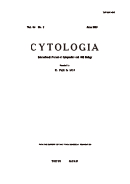
CYTOLOGIA
metrics 2024
Charting New Frontiers in Cytological Research
Introduction
CYTOLOGIA is a prominent academic journal published by University of Tokyo Cytologia, specializing in the fields of Animal Science, Plant Science, Cell Biology, and Genetics. With origins dating back to 1929, this journal has been at the forefront of cytological research and continues to contribute to advancements in both basic and applied sciences. As of 2023, it holds a respectable position in various Scopus categories, with a Q3 ranking in Animal Science and Zoology and Plant Science, alongside Q4 rankings in Genetics and Cell Biology, reflecting its dedication to quality research dissemination. While currently not an Open Access journal, CYTOLOGIA provides critical insights and findings that are pivotal for researchers, professionals, and students aiming to further their understanding of cytology and its applications in diverse biological fields. With a historical legacy and ongoing relevance, CYTOLOGIA remains a vital resource for anyone engaged in cutting-edge research or seeking comprehensive knowledge in the biological sciences.
Metrics 2024
 0.27
0.27 0.60
0.60 0.60
0.60 30
30Metrics History
Rank 2024
Scopus
IF (Web Of Science)
JCI (Web Of Science)
Quartile History
Similar Journals

Applied Biological Research
Exploring Interdisciplinary Pathways in BiologyApplied Biological Research is a dynamic journal issued by the CENTRE ADVANCEMENT APPLIED SCIENCES, specializing in the interdisciplinary fields of biochemistry, genetics, and molecular biology. With its ISSN 0972-0979 and E-ISSN 0974-4517, this journal serves as a critical platform for the dissemination of peer-reviewed research that addresses pressing challenges and innovations within biological sciences. Although currently it does not adopt an Open Access model, it is dedicated to fostering academic discourse through rigorous publication practices. The journal's impact is underscored by its Scopus rankings, which place it in the 4th and 2nd percentiles in respective categories, emphasizing its emerging influence in the scientific community. Covering research from 2020 to 2024, Applied Biological Research is positioned as an essential read for researchers, professionals, and students seeking to stay at the forefront of biological research and application. Based in the beautiful region of Jammu & Kashmir, India, this journal is committed to advancing applied sciences through innovative research and outreach.
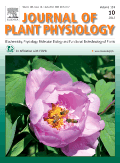
JOURNAL OF PLANT PHYSIOLOGY
Shaping Tomorrow's Agronomy TodayJOURNAL OF PLANT PHYSIOLOGY, published by ELSEVIER GMBH, stands as a leading international journal dedicated to the field of plant physiology, agronomy, and crop science. With an impressive impact factor and recognition within the Q1 and Q2 quartiles across various categories, this journal consistently ranks among the top in its field—positioned at #65/516 in Plant Science and #52/406 in Agronomy and Crop Science as of 2023. Located in Munich, Germany, it serves as a vital platform for researchers, practitioners, and students to share groundbreaking insights and advancements. Although it does not currently offer open access, the journal provides an essential repository of knowledge, publishing significant original research, reviews, and discussions on plant function, regulation, and development, thereby shaping the future of agricultural practices and contributing to our understanding of biophysical processes. Researchers looking to publish in a reputable venue or to access cutting-edge studies will find JOURNAL OF PLANT PHYSIOLOGY an invaluable resource.
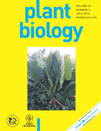
PLANT BIOLOGY
Connecting Researchers in Plant BiologyPLANT BIOLOGY is a prestigious academic journal published by Wiley, dedicated to advancing knowledge in the fields of plant science, ecology, and evolutionary biology. With an impressive impact factor and ranking in the Q1 category for Ecology, Evolution, Behavior and Systematics, and Plant Science as of 2023, it stands at the forefront of research dissemination. The journal encompasses a broad scope of plant biology topics, providing a critical platform for researchers to share innovative findings and foster interdisciplinary collaboration. Available in both print (ISSN: 1435-8603) and online formats (E-ISSN: 1438-8677), it ensures accessibility through open access options. As a crucial resource for professionals, researchers, and students alike, PLANT BIOLOGY cultivates a deeper understanding of plant systems and their ecological significance, making it an essential addition to the library of anyone dedicated to the study of biology and the environment.

JOURNAL OF BIOSCIENCES
Connecting Researchers to the Heart of BiosciencesJOURNAL OF BIOSCIENCES, published by the Indian Academy of Sciences, has established itself as a pioneering platform in the fields of biosciences, encompassing diverse research areas such as agricultural and biological sciences, biochemistry, genetics, molecular biology, and medicine. With an impressive trajectory since its inception in 1979, the journal has achieved notable recognition, securing a Q1 ranking in Agricultural and Biological Sciences and maintaining its place in the top quartiles for Biochemistry and Medicine as of 2023. With Scopus rankings placing it at #32 in General Agricultural and Biological Sciences and #65 in General Biochemistry, Genetics, and Molecular Biology, the journal reaches the 85th and 70th percentiles respectively, reflecting its impact and relevance in current scientific discourse. Although it does not offer open access, the JOURNAL OF BIOSCIENCES remains crucial for researchers, professionals, and students dedicated to advancing knowledge and innovation within the biosciences, providing a vibrant forum for high-quality research and comprehensive reviews.

BOTANICAL REVIEW
Connecting past discoveries with future innovations in botany.BOTANICAL REVIEW is a highly esteemed journal published by SPRINGER, renowned for its commitment to advancing the fields of Ecology, Evolution, Behavior and Systematics and Plant Science. Established in 1935, this journal has become a cornerstone for researchers and professionals, reflecting over eight decades of rigorous scholarship. With an impressive impact factor and ranking within the top quartile for both its fields—Q1 in Ecology, Evolution, Behavior and Systematics and Plant Science—BOTANICAL REVIEW remains a key platform for disseminating critical findings and fostering scientific dialogue. Although it is not an open-access journal, its accessibility through institutional subscriptions enhances its reach among the academic community. The journal not only emphasizes the ecological aspects of plant life but also integrates evolutionary context to inform current practices and theories in botany. With a dedication to exploring the complex interactions within botanical sciences, BOTANICAL REVIEW continues to shape the future of plant research.
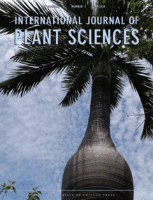
INTERNATIONAL JOURNAL OF PLANT SCIENCES
Elevating ecological understanding through rigorous research.The INTERNATIONAL JOURNAL OF PLANT SCIENCES, published by UNIV CHICAGO PRESS, is a leading journal dedicated to advancing knowledge in the fields of plant sciences and ecology. With an ISSN of 1058-5893 and an E-ISSN of 1537-5315, this journal has been a prominent platform for groundbreaking research since its establishment, featuring works from 1983 to present. It holds an impressive Q2 ranking in both Ecology, Evolution, Behavior and Systematics and Plant Science, reflecting its reputable standing within the academic community. The journal is well-regarded for its rigorous peer-review process and commitment to high-quality publication standards, making it a favored choice for researchers, students, and professionals eager to engage with the latest findings and innovative methodologies in plant research. While it does not currently operate under an Open Access model, the journal provides ample access options for institutions and individuals keen to explore its curated content. By presenting diverse studies that blend theoretical and practical insights, the INTERNATIONAL JOURNAL OF PLANT SCIENCES plays a critical role in fostering interdisciplinary dialogue and advancing the frontiers of plant science research.
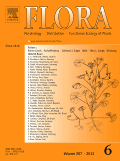
FLORA
Unveiling the Secrets of Flora and FaunaFLORA is a distinguished journal published by Elsevier GmbH, focusing on the realms of Ecology, Plant Science, and Evolutionary Biology. Established in 1975, this journal has been a vital platform for researchers and professionals, disseminating groundbreaking findings and insights relevant to the plant sciences. With an impressive impact factor and a current Scopus ranking placing it in the second quartile (Q2) across multiple categories, FLORA is recognized as a critical resource for advancing knowledge in its respective fields. The journal publishes both traditional research articles and significant review papers, ensuring a broad spectrum of academic engagement. Although not open access, FLORA remains committed to enhancing the scientific discourse and fostering collaboration among scholars worldwide. Researchers seeking to enrich their understanding of ecological dynamics and plant biology will find FLORA to be an essential addition to their academic repertoire.

Biologia Futura
Elevating Knowledge in Biochemistry and BeyondBiologia Futura, an esteemed journal published by SPRINGER HEIDELBERG, serves as a vital platform for researchers and professionals in the fields of Agricultural and Biological Sciences, as well as Biochemistry, Genetics, and Molecular Biology. Established in Hungary, this journal has been at the forefront of scientific inquiry since its inception in 2019 and continues to contribute significantly to advancing knowledge through rigorous peer-reviewed articles. With current rankings placing it in the second quartile for Agricultural and Biological Sciences and third quartile for Biochemistry, Genetics, and Molecular Biology according to Scopus metrics, it reflects a robust academic quality and reach. Scholars are encouraged to share their original research, reviews, and innovations that intersect these dynamic fields. Although not an open access publication, Biologia Futura ensures wide dissemination of high-impact research from its notable address at Tiergartenstraße 17, D-69121 Heidelberg, Germany, aiming to foster collaboration and discovery within the global scientific community.

IN VITRO CELLULAR & DEVELOPMENTAL BIOLOGY-PLANT
Advancing Plant Science Through Rigorous ResearchIN VITRO CELLULAR & DEVELOPMENTAL BIOLOGY-PLANT, published by SPRINGER, is a pivotal scholarly journal dedicated to advancing the understanding of plant cellular biology, developmental processes, and biotechnology. With its ISSN 1054-5476 and E-ISSN 1475-2689, this journal has been a key resource since its inception, converging years from 1972 through 2024. The journal's robust impact is reflected in its 2023 Scopus rankings, placing it in the 77th percentile in the field of Plant Science and showcasing its relevance through quartile classifications such as Q3 in Biotechnology and Q2 in Plant Science. Although not fully open access, its rigorous peer-reviewed articles provide critical insights and foster innovative research, making it an essential read for researchers, professionals, and students dedicated to exploring the complexities of plant biology and biotechnological applications. By regularly featuring cutting-edge studies, IN VITRO CELLULAR & DEVELOPMENTAL BIOLOGY-PLANT serves as a vital platform for exchanging knowledge that drives the field forward.
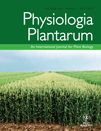
PHYSIOLOGIA PLANTARUM
Connecting Researchers to the Frontiers of Plant SciencePHYSIOLOGIA PLANTARUM, published by WILEY, is a prestigious journal in the fields of plant science, physiology, and genetics, known for its impactful contributions since its inception in 1948. With an impressive impact factor and a consistent ranking in the Q1 and Q2 quartiles, it stands out in critical disciplines such as cell biology and biochemistry, ranking #24 in Plant Science with a remarkable 95th percentile standing. This journal primarily serves researchers and professionals committed to advancing the understanding of plant functions, responses, and their molecular mechanisms. Its broad scope allows for a diverse array of studies, ensuring that groundbreaking research is accessible to the global scientific community. Although it does not offer Open Access, PHYSIOLOGIA PLANTARUM remains a vital resource for scholars looking to stay at the forefront of plant biology and related fields.